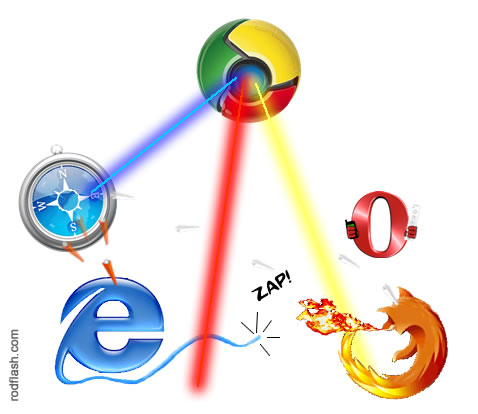At the beginning of commercial internet era, around 1994, we used to have almost one browser available, Mosaic. In these times, Netscape came with their browser and became a success, even charging users for their software. Trying to enter in the internet market, Microsoft tried several times to include Internet Explorer in their success Operational System. Between versions 3 and 4, Microsoft got a great amount of internet users. A browser battle have started.
At version 5 and 6, Microsoft’s Internet Explorer got important checkpoints: reach almost unanimity with internet users, destroy it’s main competitor (Netscape), kept other competitor far away (Opera), received proceedings for monopoly from the European Union and left many developers angry for not following the W3C’s HTML rules in your products.
Following the hype, and have nothing to lose after the defeated by giant Microsoft, Netscape decided to open the interpreter source code of your browser, giving place to the Gecko project, which would then be managed by the Mozilla Foundation. Shortly, the foundation launches its own browser (Mozilla) that takes the place of the defeated Netscape. With little impact, the Foundation decided to create a version more simple but powerful and more commercial but free. Firefox was born.
The browser has been adopted by many users, even with little use if comparing to the percentage of IE. One of the supporters of the project was Google, the world’s most famous search site. Opera is another browser that has always been “hidden” in main graphics, also begins to gain a large community of users, because it’s the industry pioneer in mobile devices and video games.
In 2008 the war seems to have gained a new landmark. Apple launched a version of it’s Safari browser for Windows. The browser was also nearly unanimous in Mac platform, especially after Microsoft deprecated the development of Internet Explorer for MacOS. The interpreter of Safari, Webkit, was already being used in browsers for other platforms such as Linux and Konqueror and in iPhone’s Safari.
The Chrome arrival brought to the browsers war the reason that should have generated the entire fight from the start: speed. Developers invested to improve the JavaScript interpreter to primarily increase the speed AJAX based sites. Also the loading speed, the memory usage of tabs and compliance with the standards of the W3C has been improved in new versions.
Everyone will win from this new battle. Browsers should be lighter, faster and we can finally choose what’s best without affecting the basic functionality that is browsing the internet. Developers will also be grateful to be able to “abuse” with more memory resources and create dynamic websites that are always consistent regardless of the platform and the browser used.




Todos vamos ganhar com esta nova batalha, disse tudo…
1. O Internet Explorer, versão 8, foi/é a pior coisa criaada pela Microsoft, a par do Windows Vista de tão má memória.
2. O OPERA, na sua singela beleza e funcionalidades, deveria ser eleito como o um dos melhores browssers do mundo.
3. O fantástico SAFARI merece o podium, tal a versatilidade das suas funções, rapidez e beleza estética.
4. O Firefox… quer ser tão bom que exagera nos extras, desnecessários.
5. O Chrome pode ser muito rápido… mas á tão pobrezinho!!!
EU VOTO:
1º.: SAFARI e OPERA
3º.: Firefox
4º.: Chrome
5º.: Internet Explorer 8 – porque está SEMPRE a informar que teve um problema e vai desligar (embora não desligue). E resposta da Microsoft: “Tem que falar com o fabricante do computador”. E o fabricante do computador:”Tem que falar com a Microsoft.
Então e para ambos, BADAMERDA em bom português!!!
Bom se vcs quer ver algo realmente engraçado sobre esta guerra vejam esta tira:
http://blogdonetmind.com/humor/a-guerra-dos-navegadores/